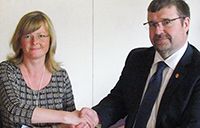
Vice-President Research & Innovation Robert Haché recently signed a memorandum of understanding (MOU) between York University and Justus Liebig University Giessen (JLU), Germany to provide a framework for research collaborations between the two organizations.

Above: From left, standing outside of the Kingbridge Centre Retreat, are Professor Doug Crawford, principal investigator for the CREATE portion of the program, German Consul General (Toronto) Walter Stechel, York VP Research & Innovation Robert Haché, Director DFG Office North America/New York Annette Doll-Sellen, Norman Marcotte, director of innovative collaborations, Science Promotion and Program Operations, Co-leader (speaker) of the German IRTG portion of the program Frank Bremmer from Marburg, Germany
The MOU was signed at the second annual retreat for the 'Brain in Action' CREATE-IRTG (International Research Training Program), jointly funded by the Natural Sciences & Engineering Research Council of Canada (NSERC) and the Deutsche Forschungsgemeinschaft, also known as the German Research Foundation (DFG). The MOU was signed on behalf of JLU’s Faculty of Psychology and Sports Science and included goals such as, supporting the exchange of teaching staff and researchers for the planning or implementation of research and teaching projects, the exchange of undergraduate and graduate students, as well as providing mutual support in the supervision and international networking of doctoral candidates, to name a few.
“This agreement enhances opportunities to support student and faculty exchanges across York. This MOU is particularly important to advancing research in neuroscience as led through York’s Centre for Vision Research,” said Robert Haché, York’s vice-president research & innovation. “We look forward to working with our research partners and recognize the importance of international research collaborations in building and enhancing opportunities for research training and the sharing of global perspectives.”

Above: IRTG co-leader Katja Fiehler (Giessen) with VPRI Robert Haché at the MOU signing
The retreat was held in Canada for the first time from June 8 to 11, as part of the NSERC CREATE grant led by Distinguished Research Professor Doug Crawford, in the Faculty of Health and Canada Research Chair in Visual-Motor Neuroscience. The retreat also included investigators at the Western Brain and Mind Institute and the Queens Centre for Neuroscience Studies, as well as partners at Giessen and Marburg, Germany.
The Canadian-funded component of the Brain in Action program, an international multidisciplinary & collaborative neuroscience training program, is based in York’s Centre for Vision Research and supports the trans-Atlantic supervision and exchanges of graduate students and research fellows, as well as non-academic collaborations and internships. The partners from Germany are funded by the German Research Foundation (DFG). Students from all five institutes also meet weekly for a virtual seminar and lecture series. The program aims to equip young scientists with a broad range of knowledge and skills to address the complex interplay between perception and action and to apply their findings to real-world settings.
The recent annual retreat included keynote speeches from partners and collaborators, as well as progress talks from trainees (from all institutions) on their research projects. For all students this was an opportunity to meet with their trans-atlantic supervisory committees. For the CREATE students, it was also an opportunity to meet with industry partners to establish collaborations and/or internships outside of academia.
"As Canadian Director, I was gratified to see that after the first year of our joint program, the Canadian and German students have already fully integrated and are already involved in many multi-national collaborations and exchanges. It’s clear that this program is completely changing their perspective on the global nature of research and is forming relationships and collaborations that will long outlast the funding period of the program,” said Crawford.
